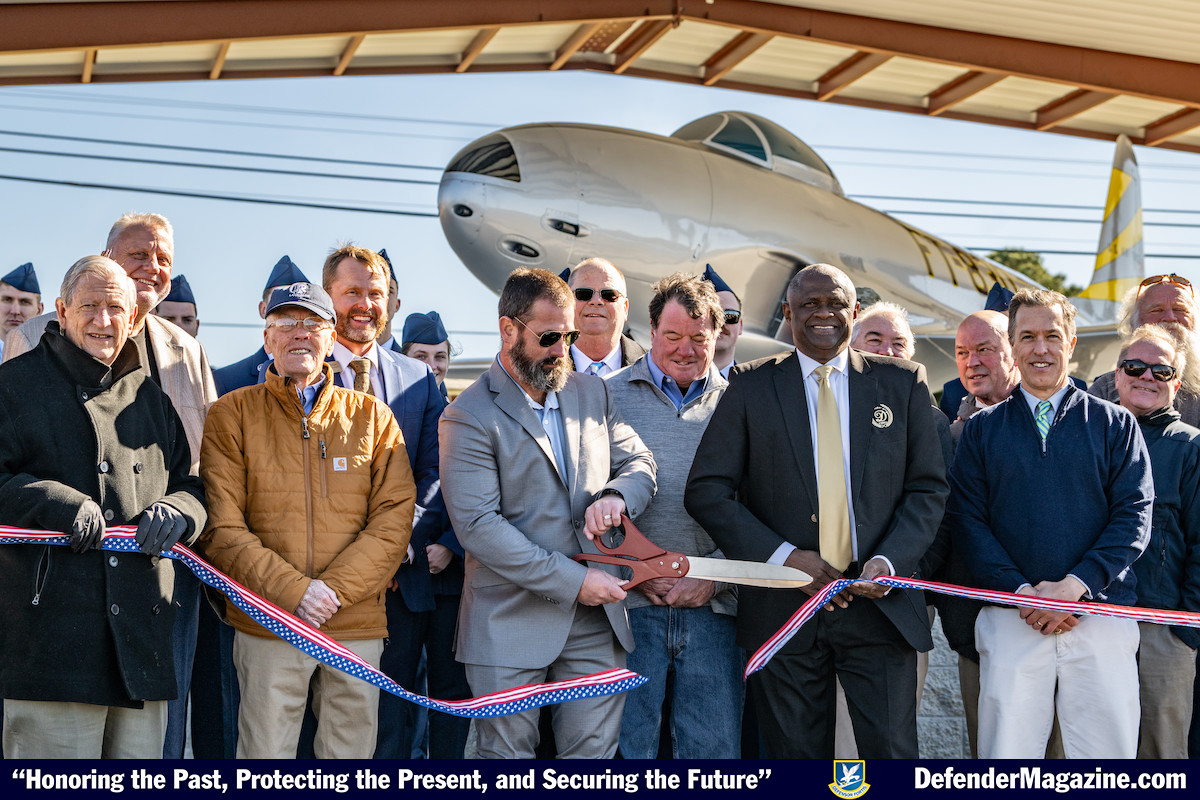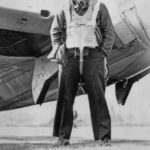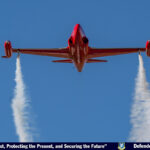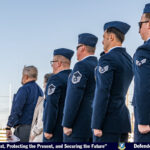
DOUGLAS, Ga — Airmen assigned to Moody Air Force Base, Georgia, participated in a ribbon-cutting and dedication ceremony for the Cadet Park and Maj. Charles J. Loring Jr. Memorial at the 63rd Army Air Force Flight Training Base in Douglas, Georgia, Nov. 22, 2024.
The World War II Flight Training Base committee, the city of Douglas, and the 63rd Preservation Society hosted the ceremony, which honored the 63rd Army Air Force Flight Contract Pilot School’s most distinguished graduate, Maj. Charles J. Loring Jr., who received the Medal of Honor after paying the ultimate sacrifice in the line of duty on Nov. 22, 1952, during the Korean War.
“If we don’t honor those or see their importance, then we may not have service members step up and serve,” said Cuppy Johndro, Loring Museum curator. “We need them to know what they mean to us and that their work is what keeps us safe every day, not just here on American soil but across the world.”
Loring flew the P-47 Thunderbolt with the 36th Fighter’s Group 22nd Squadron, completing 55 combat missions and receiving the Distinguished Flying Cross.
On his 56th mission, Loring’s P-47 was damaged, forcing him to bail out over Belgium on Dec. 31, 1944. After being captured, he remained prisoner of war until May 5, 1945.
Later in Korea, Loring flew 50 combat missions with the 80th Fighter Squadron. On Nov. 22, 1952, while leading a close air support mission, his jet sustained hits from ground fire. Embodying service over self, he crashed his plane into enemy gun emplacements, destroying them but sacrificing himself. For his bravery, Loring was posthumously awarded the Medal of Honor.
“Memorials allow us to look into the past and read about someone’s actions, whether those actions were saving someone’s life or changing the outcome of the battle,” said Mark Godwin, 23rd Wing historian. “The memorial for Maj. Charles Loring is the first thing you see when you drive into Douglas, Georgia, and someone passing through may stop and tour the memorial and think, ‘Maj. Charles Loring exemplified the first Air Force core value, service before self.”
Airmen from Moody AFB, Georgia, traveled to Douglas to support the momentous occasion alongside Charles Loring’s family and local and state representatives. The Airmen, who helped restore an F-80 aircraft like Loring’s, raised a 48-star flag on the historic flagpole, marking the first active-duty flag-raising at the air base since 1944.
“We are truly honored that the city of Douglas would honor my grandfather in such a way; we have always been very proud of him and the sacrifice he made to save his comrades on the ground,” said Joseph Matta, Maj. Loring’s grandson. “It means just a little more whenever you see other folks recognize him that aren’t from around Maine, and the Douglas training facility was such an important part of making him the pilot that he was. We are very honored and thankful to be invited, to be a part of such a great tribute to him and the men and women that worked at Douglas Air Base.”
To honor his grandfather, Matta read the Medal of Honor citation during the ceremony, providing a personal connection to Loring’s legacy while honoring his heroism and impact on future generations. The museum curator sympathized with this sentiment.
“I think the lesson that he taught us is by serving and fighting, we honor the greater good; we honor our duty and country,” Johndro said. “We put others’ needs ahead of our own, regardless of the role we play while serving. Serving the military is one of the greatest honors of my life. It made me a better person and a strong worker, all while giving me the work ethic and dedication to any job I take on.”
According to retired U.S. Air Force Lt. Col. Timothy Oliver, World War II Flight Training Museum docent, the eight members of the Loring family tethered the memorial and Loring’s legacy together by offering attendees an opportunity to learn more about him beyond his war-hero moniker. Oliver had his own moment of reflection following the memorial.
“When Charles J. Loring, Jr. came to Douglas in 1942 to learn how to fly, he was like all the other young men who had no idea what the future has in store for them,” he said. “He was one of thousands who trained here in the early 1940’s and many of whose stories are preserved for posterity in our World War II Flight Training Museum exhibits and archives. Members of the 63rd Preservation Society endeavor to tell our visitors those stories and give them personal insight to what happened at the old Douglas Air Base during World War II.”
There was a deep sense of pride and gratitude echoed by the Loring family who reflected on the personal significance of being at the historic airbase. Paul Loring, Maj. Charles J. Loring Jr.’s brother, shared an emotional connection to the very place where his brother had once served.
“This experience and being here has been so unbelievable,” said Paul Loring. “As I walked up to the barracks—the same barracks from World War II—it hit me that my brother had been there, and it made me emotional.”
The ribbon cutting and dedication of the Cadet Park and Maj. Charles J. Loring, Jr. Memorial, honored the legacy of a true American hero, and celebrated Loring’s Medal of Honor dedication while highlighting the importance of remembering military service and sacrifice.
The memorial will serve as a catalyst to inspire future generations and as a reminder of the courage and selflessness of those who serve.
- Published
- By Airman 1st Class Savannah Carpenter
- 23rd Wing Public Affairs




